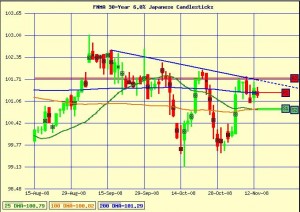 Spotlight on bright side of mortgage market
Spotlight on bright side of mortgage market
ass=”summary” style=”background: white; margin: 8.15pt 0in 21.75pt;”>It would be a big stretch to label housing the sunny side of the market at the moment, but there’s a lot more light there than in most other financial sectors because there is no shortage of money for home mortgages.
Syndicated Columnist
Credit squeeze, credit freeze, credit-system seizures: Everybody knows how severe and painful the global financial breakdown has been, with banks unwilling to lend even to other banks.
But what about mortgages and real estate? Can you still get a home loan with less than a 20 or 30 percent down payment? Or with a credit score below 720?
Absolutely. It would be a big stretch to label housing the sunny side of the market at the moment, but there’s a lot more light there than in most other financial sectors. Consider these facts:
• There is no shortage of money for home mortgages, no freezing of credit to purchase or refinance a house. Why? Because the mortgage market effectively has been federalized — at least for the time being.
More than 90 percent of new loans now are being made through the Federal Housing Administration (FHA) insurance program, plus Fannie Mae and Freddie Mac. FHA is owned by the federal government, and Fannie and Freddie are operating under federal conservatorship.
All three have unfettered access to global capital markets at rock-bottom costs because their borrowings are fully guaranteed by the Treasury.
Ginnie Mae, which is FHA’s pipeline to the bond market, recorded an all-time high of $29 billion in new mortgage-backed securities issued in August.
• Loan terms and credit underwriting standards have been toughened up, but you can still put down 3 percent (3.5 percent after Jan. 1) on an FHA-insured mortgage and 5 percent on certain Fannie Mae and Freddie Mac loan programs with private mortgage insurance.
FHA’s credit standards are generous and forgiving; the agency exists to help people with less-than-spotless credit histories. Fannie Mae and Freddie Mac have raised their credit-score requirements over the past year, but buyers and refinances with scores in the upper 600s can still qualify for loans having reasonable rates and fees.
• Despite the global financial system’s quakes, mortgage rates not only remain low by historical standards but have actually declined.
For the week ending Oct. 8, according to the Mortgage Bankers Association, average 30-year fixed rates nationally dropped to 5.99 percent, and 15-year mortgages averaged 5.71 percent. Freddie Mac said 30-year rates dropped to 5.94 percent.
• Maximum loan amounts through FHA, Fannie and Freddie in high-cost local markets on the West and East coasts, such as Seattle, continue to be $567,500 through December. In January, the high-cost maximum is projected to dip to approximately $522,000.
• Home prices — pushed by foreclosures and short sales — have rolled back to 2003 and 2004 levels or lower in many former boom markets.
As a result, buyers are coming off the sidelines, making offers and writing contracts. The pending home-sales index jumped by 7.4 percent based on purchase contracts signed in August, according to the National Association of Realtors.
The heaviest increases — pointing to higher closed sales in the coming two to three months — were in California, Florida, Nevada and the Washington, D.C., area.
Housing and mortgage leaders say consumer worries about the stock market have obscured positive developments in real estate, where pricing pain and downsizing have been facts of life for 2-½ years.
David Kittle, president and CEO of Principle Wholesale Lending and incoming chairman of the Mortgage Bankers Association, says, “the mortgage market has never shut down” despite the global financial crisis.
Money is “clearly available as long as you can qualify for it” with at least a modest down payment and decent credit history,” Kittle says.
Matt Vernon, a national retail mortgage-sales executive for Bank of America, said, “We’ve got more than enough liquidity” to handle mortgage demand. “We are open for business.”
Most of the bank’s production is now funded through FHA, Fannie and Freddie.
On the front lines, mortgage-company owner Jeff Lipes, president of Family Choice Mortgage near Hartford, Conn., says: “I don’t think consumers really know how free-flowing capital is right now in the residential mortgage market. There are no shortages, no breakdowns. People ought to be aware of that.”
Bottom line: Scary as the news has been about stocks and banks, this is not the case for mortgages.
Besides shopping at large national lenders, check with local banks and credit unions that may be originating loans for their own portfolios — not for Fannie, Freddie or FHA. Many of them are healthy, have cash to lend and may be surprisingly competitive on terms and rates with the big boys.
Kenneth R. Harney: kenharney@earthlink.net
Copyright © 2008 The Seattle Times Company
